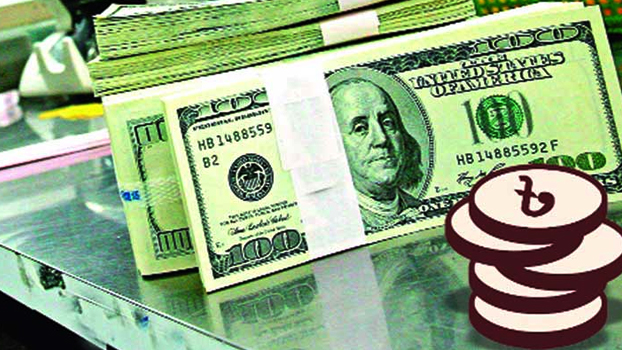Forex reserves hit $34b record

The foreign exchange reserves hit an all time high crossing $34 billion for the first time despite a global economic recession amid the Covid-19 crisis.
Forex reserves reached $34.23 billion till June 3 following lower import payment pressure due to the coronavirus pandemic. The previous highest reserves amounting to $33.68 billion was recorded on September 5, 2017.
The country’s reserves again crossed the $33 billion-mark at the end of April after almost 2 years, up about $1 billion over that of the corresponding time of the previous year, according to Bangladesh Bank (BB) data.
It was $32.55 billion on March 24 in this year. The lower import payment side by side the moderate remittance inflow has pushed up foreign currency reserves in recent months, experts and bankers opined.
The reserves are sufficient to cover about 7 months’ imports for the country of 160 million people, an economist said.
Adel Haque, a former BB joint director, told Bangladesh Post that if the country has strong foreign exchange reserves, it will be more capable of paying import bills, which will ultimately help raise its rating.
A BB senior official said higher gold prices in the global market as well as lower import bills have helped to increase the country's forex reserves recently.
He said foreign exchange market had faced a huge demand in the last several years for greenbacks because of higher payment for imported items, including capital machinery, fuel oils and food grains.
As part of its move, the central bank sold US dollars directly to the commercial banks to meet higher import payments putting foreign exchange reserves under pressure.
Otherwise, the reserves would have risen further in recent months, he added. Eminent economist, Zahid Hussain said, the foreing exchange market is still facing a huge dollar crisis as export earnings and remittance flow have reduced due to the coronavirus pandemic.
On the other hand, fresh import orders are now lower, but deferred payments for the same are continuing.
Although expatriates had faced several problems in the wake of a fall in oil prices, remittance got back its momentum within the shortest time due to a steady outflow of migrant workers, he added.
Remittance has been leading a silent economic revolution in Bangladesh since the country’s independence, as it has contributed a lot to making the economy vibrant, he mentioned. Remittance has also strengthened the country's foreign exchange reserves to a great extent, he said.
Hussain said the government should adopt a new plan for the expatriates to overcome the bad situation, and give proper training to create skilled manpower to boost the remittance inflow.
He said the central bank should not intervene in the foreign exchange market as deprecation of local currency has helped to raise export earnings and remittance inflow.
However, the forex reserves was $31.27 billion in January, $32.23 billion in February, $31.78 billion in March, $32.12 billion in April, $31.34 billion in May, $32.71 billion in June, $32.09 billion in July, $32.77 billion in August, $31.83 billion in September, $32.43 billion in October, $31.72 billion in November and $32.68 billion in December in 2019, and $32.38 in January, $32.98 billion in February, $32.55 billion in March, $33 billion in April and $34.23 billion in May in 2020 respectively.
However, the central bank has recently resumed selling the greenback to banks for reducing extra pressure on the market, caused by lower remittance inflow following the ongoing coronavirus outbreak, the central bank officials said.
They said the central bank predicted that the reserves would decrease in the first week of June after making a routine payment to the Asian Clearing Union (ACU) against imports during the April-May period.
The ACU is an arrangement involving Bangladesh, Bhutan, India, Iran, Myanmar, Nepal, Pakistan, Sri Lanka and the Maldives through which intraregional transactions among the participating central banks are settled on a multilateral basis.
The union started its operation in November 1975 to boost trade among the member countries. Bangladesh and Myanmar joined the union as the sixth and seventh members in 1976 and 1977 respectively.
Bhutan joined the ACU in December 1999 and the Maldives in January 2010.




